

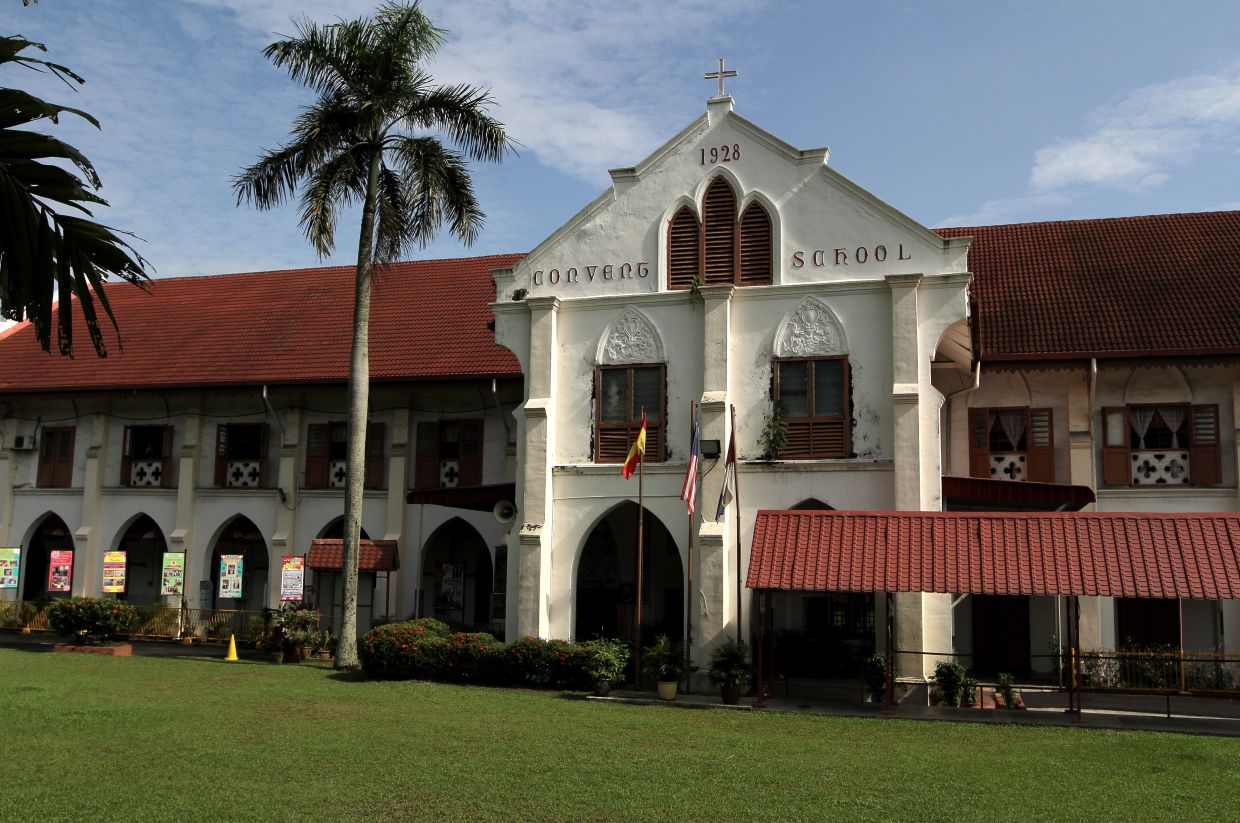
The Klang Convent school is also a historical institution which is not utilised commercially.
THE Infant Jesus Sisters (IJS), who are the owners of the country’s convent schools, have appealed for a review of the need for quit rent on some of their school buildings as they are not utilised commercially.
Sister Theresa Chua, who heads IJS Malaysia, says the quit rent for some of the school buildings are exorbitant.
“There are no commercial gains whatsoever, but we have to send appeal after appeal for the rate to be reduced.
“Why can’t this be a standard policy with the Education Ministry (MOE) sending a directive to the Land Office to get this done,’’ she asks.
Sister Theresa says many people assume that the Sisters own many properties in prime areas with high commercial value if sold.
“All the existing convent schools are used by the government. Selling may not even be an option as requesting the return of convent schools from the government takes at least five years or more of negotiations, besides justifying the reason for the school to be returned although the property belongs to the Sisters,’’ she says.
There are currently 56 convent schools comprising 34 primary and 22 secondary schools. In 2016, the IJS had already requested the return of its 170-year-old Convent Light Street (CLS) from the MOE with the intention for the school building to continue as an educational institution for all children of Malaysia.
The new school would be coed and placed under a private operator. The IJS made the decision to ask for CLS to be returned following declining enrolment in the past decade and escalating upkeep costs of the heritage building.
Sister Theresa says the Sisters have no properties to sell, except for one in Cheras, Kuala Lumpur, which is home to elderly Sisters.
“They will have no place to live if they sell their home in Cheras to pay for repairs to the schools. The Sisters have no income and we need to cope with ageing and retired Sisters,’’ she adds.
Sister Theresa appeals to the MOE to hear their concerns and to appoint special officers who understand the issues of convent schools, similar to those appointed to deal with Chinese and Tamil vernacular schools.

Convent Bukit Nanas is one of the oldest schools in Malaysia and has an illustrious list of alumni. — Filepic/The Star
CONVENT schools in Malaysia have a distinguished history dating back to the 19th century. They have iconic heritage buildings and have produced many prominent personalities over the decades.
The 170-year-old Convent Light Street (CLS) in Penang is the oldest girls’ school in South-East Asia and is located in a heritage zone.
Founded by French Catholic nuns in 1852, it is one of the most highly regarded missionary schools in the state. However, in the past decade, CLS has been hit by declining enrolment thanks to competition from international and Chinese schools.
Convent schools were once premier schools that used the English language as the medium of education, and were known for producing well-rounded students who excelled academically as well as in sports and music.
The three founding nuns were part of a group of five who managed to make it to Penang alive after the arduous journey from France via Singapore.
The sprawling CLS grounds were also home to the administrative offices of Captain Francis Light after he founded George Town in 1786. Stamford Raffles, the founder of Singapore, also worked at Govern-ment House in the CLS grounds. Penang, then known as the Prince of Wales Island, was his first overseas posting.
Convent Bukit Nanas (CBN) in Kuala Lumpur is also one of the oldest schools in Malaysia – established in 1899 – and is one of the first schools to be distinguished as a Cluster School of Excellence by the Education Ministry
Its alumni includes former minister Tan Sri Rafidah Aziz, Tengku Permaisuri Norashikin Abdul Rahman of Selangor, Bank Negara governor Tan Sri Nor Shamsiah Mohd Yunus, prominent lawyers Raja Eleena Almarhum Sultan Azlan Muhibbuddin Shah Al-Maghfur-lah and Ambiga Sreenevenan and the late singer Adibah Noor.
CLS has its list of famous alumni too, such as Datuk Ooi Chean See, Malaysia’s first woman orchestra conductor; Datuk Ng Poh Tip,The Star’s first woman group chief editor; and Datin Paduka Tunku Khadijah Tunku Abdul Rahman Putra, our first prime minister’s daughter, who studied as a full-time boarder in CLS.
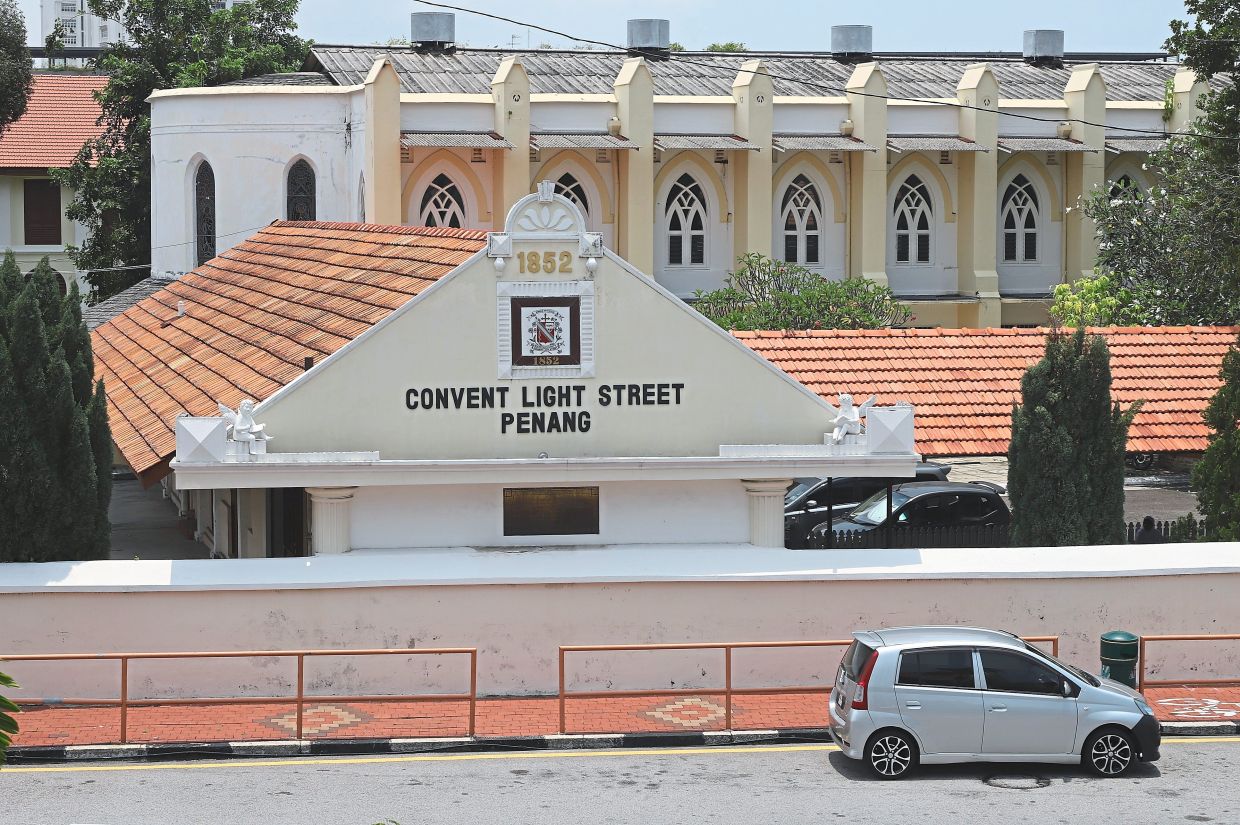
Storied school: Convent Light Street was set up in 1852, the first IJS convent school in the country. Many of these highly regarded mission schools were built over 100 years ago. — LIM BENG TATT/The Star
THE 56 convent schools nationwide, which are run by the Infant Jesus Sisters (IJS), are in desperate need of financial support with at least 90% of the school buildings in dilapidated conditions in the absence of sufficient maintenance funds.
Many of these highly regarded convent schools were built over 100 years ago, with the first IJS school as well as orphanage set up in Light Street, George Town, in 1852.
At least two schools caught fire recently as they had to cope with roof leaks, wiring and plumbing issues, and even floods.
In a rare interview, Sister Mary Theresa Chua, the Provincial of the IJS – which is legally known as the Lady Superior of the Society of Saint Maur – says the estimated RM3mil annual grants from the Education Ministry (MOE) for all 56 schools would only be enough for basic maintenance, working out to around “RM50,000 to RM70,000 for each school’’.
“The buildings are very old and daily use, with minimal repairs, has taken a toll. In short, the yearly government allocation is barely enough to cover repairs and maintenance costs as we always must rely on donors and carry out fund-raising initiatives,’’ she says.

Sister Theresa: ‘The yearly government allocation is barely enough to cover repairs and maintenance costs and the schools have to rely on donors and raise funds themselves.’
For example, she points out how the authorities have yet to carry out repair work on the slope bordering the 123-year-old Convent Bukit Nanas after a landslip in February this year. The site borders the Kuala Lumpur Forest Eco Park, and Sister Theresa fears that the ongoing wet spell and the year-end rainy season would be a problem.
In 2020, a landslip also hit the school, which was established in 1899, after heavy rain caused a near collapse of a retaining wall.
Sister Theresa describes the plight of convent schools in Malaysia, which have produced hundreds of thousands of students including prominent figures, as desperate.
“We are in dire straits. We have no one to turn to and we pray that our problems, especially involving the safety of our students and teachers, will be heard,’’ she says.
Sister Theresa explains insurance premiums are not covered by the government and “when any unfortunate incident happens, the Sisters are left to handle and manage them”.
“Often, the Sisters have no means to make proper major repairs as evidenced in the latest Convent Bukit Nanas landslip.
“What makes no sense is that the landslip was due to the Forestry Department felling trees and cutting through the hillslope, thus loosening the soil and affecting water flow resulting in the clogging and retention of mud, which in turn blocks drains so that water is not able to flow,’’ she adds.
Sister Theresa says there is an urgent need for the MOE to meet Mission school authorities to talk about critical building issues, such as, for example, electrical appliances like airconditioners, computers and projectors that have led to capacity overload.
“We are in a dilemma. Most of these schools are over 100 years old and cannot cater for high voltage use.
“However, digital equipment is necessary in the current era and environment for teaching purposes,” she notes.
To support the Convent schools -– OCBC Bank Bhd, Account No : 701-157675-5
For more information, also call Sr Theresa Chua, Tel- 03-20318243 or 03-20780615
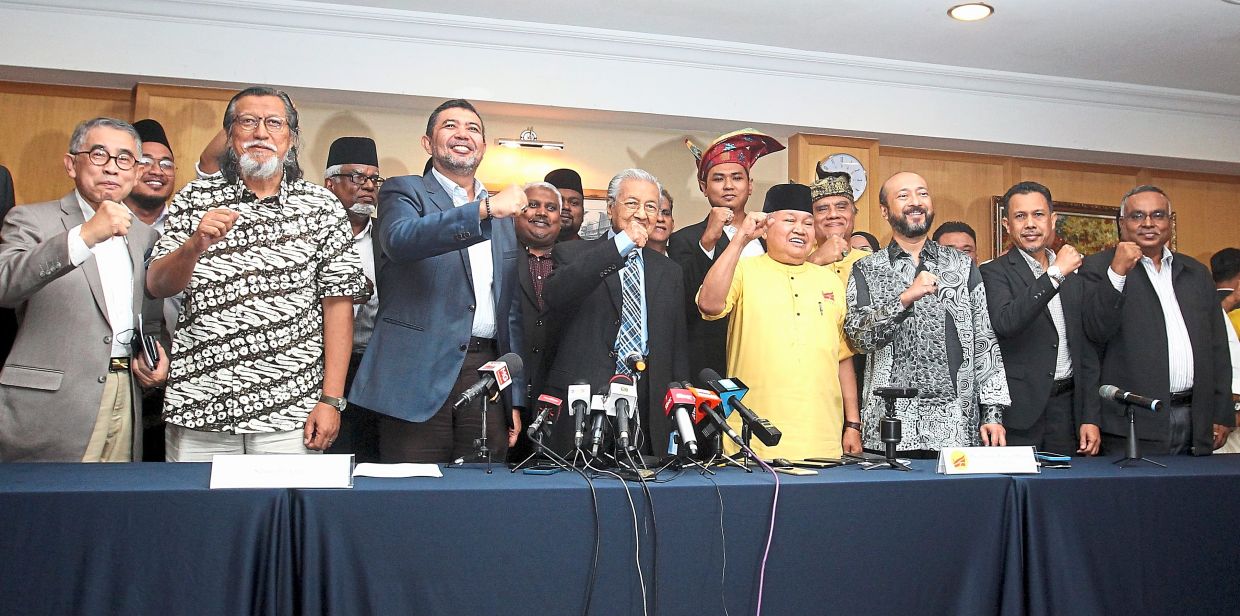
Dr Mahathir announcing the formation of a new coalition comprising Malay-based parties, non-governmental organisations, academics and professionals, recently. – AZLINA ABDULLAH/The Star
THE last thing the country needs is another political entity that champions race and religion exclusively. Who cares if it’s called a coalition, movement, or political party?
Malaysia has allowed race and religion, as well as rampant corruption, to become the bane of its existence. This makes for such a toxic combination.
There’s nothing worse than taking a position or stand in the name of God and race, especially if it’s purportedly done for political reasons.
On the cusp of Malaysia’s 65th National Day, it’s soul-sapping to read about Tun Dr Mahathir Mohamad announcing the formation of a new coalition comprising Malay-based parties, non-governmental organisations, academics and professionals, too.
The Gerakan Tanah Air coalition includes his party, Pejuang, the National Indian Muslim Alliance (Iman), Parti Bumiputera Perkasa Malaysia (Putra) and Parti Barisan Jemaah Islamiah Se-Malaysia (Berjasa).
Dr Mahathir says the movement was formed to change the government and challenge Umno in the next general election, “and to fight for the interest of the Malays.”
Despite losing all the 42 seats Pejuang contested in the Johor state elections, Dr Mahathir is still determined to contest in 120 constituencies from the 222-seat Dewan Rakyat.In the Johor state polls, the fledgling party was humiliated when all the Pejuang candidates lost their deposits.
Although Dr Mahathir blamed “money politics” for their defeat, the results were hardly surprising since not many voters found the party appealing.
It seems that Dr Mahathir has opted to use race as a selling point in the elections.
It has worked effectively in many predominantly Malay constituencies, especially for Umno, PAS and even Bersatu, whose membership is only open to bumiputras or Muslims.
In the case of Barisan Nasional, it has component parties representing different ethnic groups, where the politics of consensus can be practised. Likewise, the Perikatan Nasional is a coalition with some semblance of diversity.
But the same cannot be said of Gerakan Tanah Air, with the party deciding that it has no intention – or would even try tokenism – to work with other Malaysian groups.
The formation of Gerakan Tanah Air is a retrogressive move. It is a devastating setback to politics in Malaysia, where there are still many politicians who prefer to be champions of their narrow communal interests.
Despite claiming to uphold the racial and religious interests of their communities, corruption has eaten into institutions which they are supposed to protect.
There are also religious figures, especially from PAS, who have even become apologists for corruption and worse, have proclaimed that a corrupt Muslim leader is more acceptable than a non-Muslim leader.
We don’t need to go into details but there have been enough court cases where politicians, using the mantra of race and religion, have enriched themselves at inconceivable scales.
They have plundered the nation’s wealth and stolen from their communities with nary a second thought.
How these politicians get away with such warped thinking in this day and age is simply mind-boggling.
The fact that PAS keeps getting re-elected in some states probably reinforces their belief that they can get away with anything, so long as race and religion are utilised.
Malaysia desperately needs personalities, not just politicians, who are prepared to speak up for good governance by using a Malaysian approach, because the future of Malaysia is dependent on every citizen.
No political party is going to form the next federal government without the participation of all races.
Ironically, while Dr Mahathir talks of Malay-Muslim unity, his opponents are, in fact, the pre-existing Malay-based parties.
There are more fights, disruptions and bickering at political functions and football matches than at Oktoberfest events.
IT may be news to some, including the Minister in the Prime Minister’s Department (Religious Affairs) Datuk Idris Ahmad, but Oktoberfest has been celebrated here for decades now.
I have lost count of the number of Oktoberfest celebrations I have attended.
My first experience of this wonderful festival was at the Malaysian German Society (MGS) in Penang in the early 80s.
For more than 40 years, the MGS Oktoberfest has attracted Malaysians with a Bavarian band specially flown in from the south of Germany, with authentic German food served.
I don’t recall any disruption to social harmony, as Idris imagines and claims.
He told Parliament recently: “Although non-Muslims are not prohibited from drinking alcohol, the government is of the opinion that allowing this festival to happen and making it open to the public should not happen, as it will cause social problems, as alcohol is seen to affect harmony, order and safety of the community.”
There are more fights, disruptions, and bickering at political functions and football matches than at Oktoberfest gatherings.
If it leads to drink driving, then that is the business of the police, and not Idris’ for sure.
Non-Muslims cannot be blamed if they feel that this is another infringement of their rights.
Why should we have to confine ourselves and seemingly hide just to have a drink?
Malaysia is a multi-ethnic country, and non-Muslims are free to drink, as we know. Is this an arbitrary decision of a PAS leader or that of the government?
In recent years, there seems to be a rise in the degree of intolerance, with obstacles even placed on private companies wanting to host such gatherings.
In 2017, the One Utama shopping complex had to call off its Oktoberfest festival, despite its readiness to move the event to the basement carpark, following a directive from the Petaling Jaya City Council (MBPJ).
Non-Muslims in Malaysia know too well their limitations and when not to cross the line.
No one is foolish enough to apply for a permit to hold Oktoberfest at Dataran Merdeka, for example, or in areas which are predominantly Muslim.
It is not just disrespectful.
From a commercial point of view, it would be loss-making as it would not be the targeted consumer market.
Non-Muslims will also not extend invitations to Oktoberfest, for sure.
PAS has been consistently waging a fight against Oktoberfest since 2014, claiming that it would be insensitive to Muslims.
If we go by the twisted logic of PAS leaders, then the Kaamatan and Gawai in Sabah and Sarawak, where spirits also flow, would lead to social disharmony.
Even at the ongoing Hungry Ghost festival, fund-raising for charity is done with alcohol served at the dinners.
Does that mean this too has to be banned or hidden?
No one should stop eateries, pubs, and restaurants from holding Oktoberfest festivals, and the local authorities should not be acting against these premises.
Here’s more news for Idris.
Even predominantly Muslim countries like United Arab Emirates, Turkiye and Palestine are gearing up to host Oktoberfest again this time, after a two-year hiatus because of the Covid-19 pandemic.
In Palestine, the Taybeh Oktoberfest, which started in 2005, will be held with an expected 16,000 visitors, according to its website. Ditto for Morocco, Turkiye, Lebanon, and many other countries.
Just do a search.
In previous celebrations in Dubai, there were 32 tents, a Ferris wheel, and even a life-sized replica of the famous statue of Lady Bavaria and her lion, according to reports.
PAS seems to have become louder now, as it is in the ruling Federal Government.
But it needs to be reminded that the guardians of Islam are the Malay Rulers.
Recently, Kelantan Deputy Mentri Besar Datuk Mohd Amar Nik Abdullah claimed the people of Kelantan are happier than those in Selangor, basing his argument on Malaysia’s Happiness Index, where Kelantan was purportedly ahead of Selangor.
We do not know why Mohd Amar chose to point fingers at Selangor.
Perhaps he was chafed by the Sultan of Selangor’s royal tick-off given to Idris over the minister’s objection to the Bon Odori festival.
PAS should worry about its inability to resolve its water, logging and drug problems; the addiction to pornography; and increasing incest and molest cases, before lecturing others.
Not to forget its tainted image after its leaders tried to justify corruption and even said a corrupt Muslim leader is more acceptable than an honest non-Muslim leader.
Get your backyard in order first.
Malaysians of all faiths and races are certainly more worried about the religious and social disharmony caused by PAS.
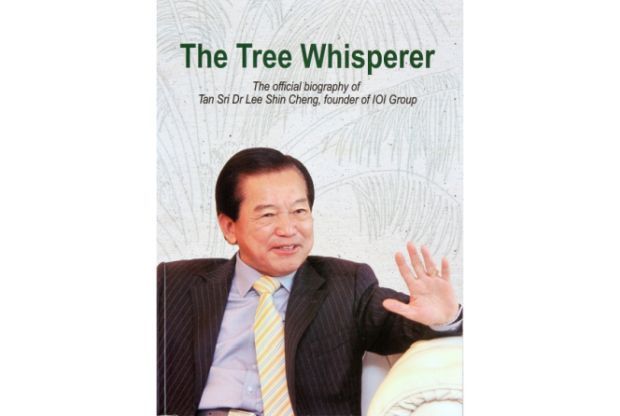
The Tree Whisperer: The Official Biography of Tan Sri Lee Shin Cheng, founder of IOI Group
HE lived a frugal life despite his fortune of billions and had no interest in or knowledge of luxury brands.
The late Tan Sri Lee Shin Cheng was more comfortable in his simple shorts while at his sprawling palm oil estates. True to his nature, he even showed up at the office in the evenings in his modest attire.
In fact, his shirts were often less than RM100 each and for 30 years, he carried a grey Samsonite briefcase bought in the 1980s.
Yet, he had no qualms about contributing millions of ringgit towards Chinese education, especially to the development of the centuries-old old Kuen Cheng High School and Shin Cheng (Harcroft) Primary School.
He also donated 30 million yuan (RM20mil) to Xiamen University Malaysia without hesitation.
The Kuala Selangor born Lee dropped out of school twice – once while in primary and later during secondary level – and was denied jobs in rubber estates, run by the British then, because he couldn’t speak English fluently.

Lee on his walkabout around his greenfield plantation in Sabah.
He was turned down for a job at an estate owned by the British company, Dunlop Estates, in the late 1960s, due to his inadequate academic qualifications.
But after making enough money about two decades later, he bought the holding company of the same estate that didn’t employ him.
Lee understood the importance of education and was determined that future generations of Malaysians would not be like him, having been born at a time of economic hardship.
Lee, the founder of IOI Group, died on June 1, 2019, just two days shy of his 80th birthday.
Three years on, his official biography (in English, no less) has finally been published and released early this month.
Most of his business friends, staff and associates are aware of his story, but this book will serve as a testimony to ordinary Malaysians in search of inspiration and useful lessons in tackling challenges.
At the tender age of 11, Shin Cheng left school to become an ice-cream seller, and in fact, was even too short to get onto the bicycle.
He tried his hands at everything, including starting off as a rubber estate cadet in Banting, Selangor, and later, a failed attempt as a pig farmer, petrol station dealer, property developer to finally, opening a whole new plantation frontier in Sabah and other parts of Malaysia.
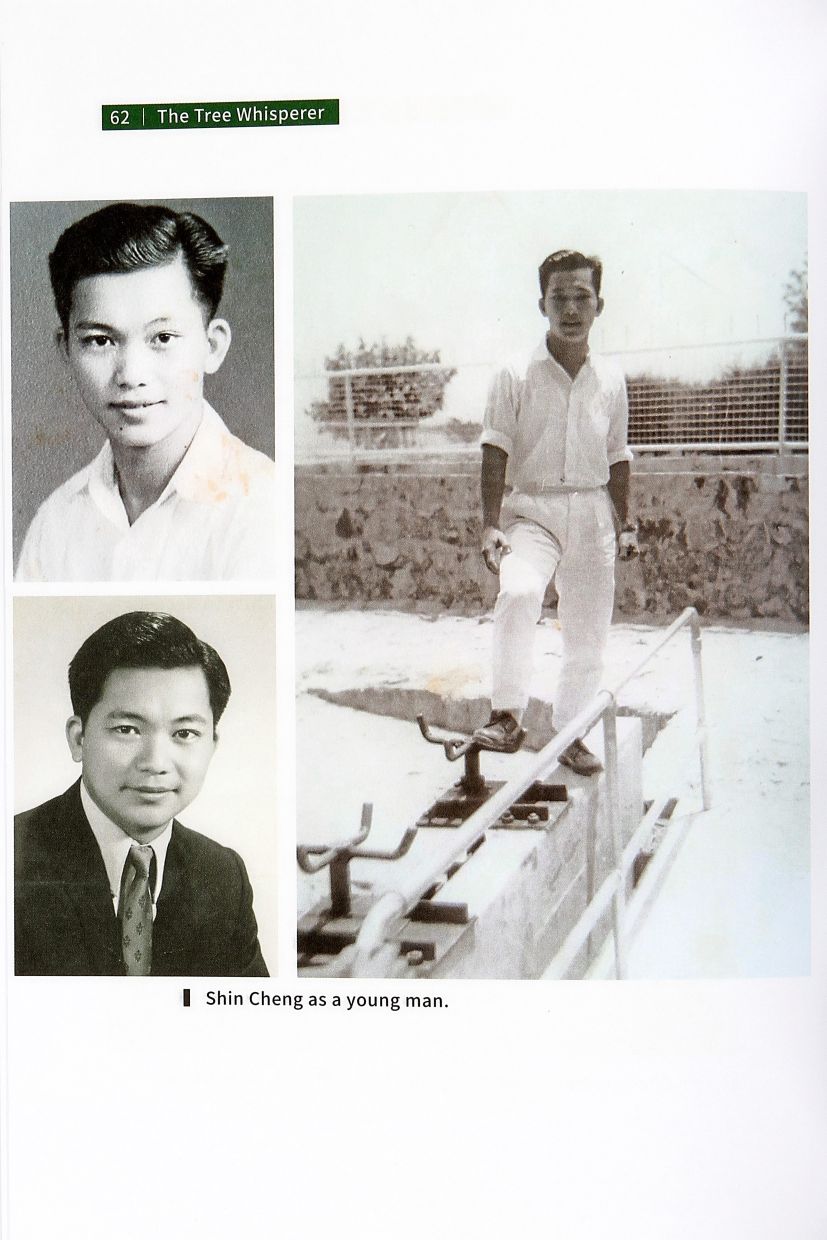
Lee as a young man.
Spending more of his time in remote areas to tend to his oil palm trees than his family, Lee would end up being aptly called “The Tree Whisperer.”
Lee was also known as the tree whisperer because he loved talking and singing to his trees. He once said every tree is different, just like women.
So, he would talk to them, get to know them better, saying it would help them grow better, according to a report in The Edge.
Known as a stern and intimidating boss who would not tolerate laziness and negligence, his management staff were known to be wary of him.
He had a keen eye for detail and in his “management walks” of his numerous businesses, everyone was expected to answer his questions.
Lee, who was fluent in Tamil, was able to interact with the Indian staff at his estates.
With a fortune worth US$4.7bil (RM19.7bil), Lee was ranked by Forbes as Malaysia’s fifth-richest man and the 325th richest man in the world in 2019.
IOI Corp, with a market capitalisation of RM26.32bil then, remains an integrated palm oil company which has operations in eight countries across Asia, Africa, Europe, and North America.
It’s among the 30 largest companies listed on the Main Market of Bursa Malaysia, forming one of the component companies of the FTSE Bursa Malaysia KLCI, the stock exchange’s benchmark index.
As for IOI Properties, valued at RM7.37bil, it’s a property development and investment company which has a substantial presence in Singapore and China.
It was the property arm of IOI Group prior to its spin-off listing on Bursa Malaysia in January 2014.
The book is essentially divided to his childhood days, his meeting with his future wife, Puan Sri Hoong May Kuan, who was a teacher in a rural school, his early working days and business ventures, his growing family, his expanding ventures, his relationship with his family and responsibilities, and more importantly, his contributions to the community.

Lee and Puan Sri Hoong tied the knot in 1963.
On the corporate front, Lee was ever the polite gentleman. But even gentlemen can be aggressive if the situation warrants it.
Two chapters have been devoted to the hostile takeover bid by Sime Darby Bhd to gain control of Palmco Holdings Bhd, an oleochemicals manufacturer in which IOI Corp was the single largest shareholder at the time.
Sime Darby had, in July 2001, made an unexpected conditional voluntary offer for all the shares – at RM4.35 apiece – in Palmco.
A few hours later, IOI Corp, which held a 32.1% stake in Palmco then, said it had no intention of accepting Sime Darby’s offer.
It was a dramatic business story as the media played up the fight between IOI and Sime Darby.
Within days, IOI Corp launched a takeover on Palmco by matching Sime Darby’s offer, forcing the latter to raise its asking price to RM4.60 per share.
Lee emerged the victor finally. The takeover saga ended in October after IOI Corp got hold of more than 50% stake in Palmco.
Lee never stopped working. In 2017, though, he was diagnosed with lung cancer. After several visits to the hospital for treatment, it was finally time for him to go home.
However, he arrived an hour later than expected.
“It turned out that he had asked his driver to make a stop at IOI City Mall before heading home.
“At that time, construction work for the mall’s second phase of expansion was already underway, and he wanted to look.
“Too weak to walk or stand, Shin Cheng could only remain in the car while he met with executives from different departments.
“They formed a neat circle around the car, taking turns to answer his questions and update him on the construction’s progress.”
Although Lee was a well-known public figure, he kept deferring writing a book because he was still energetic and wanted to do more in business and education before committing himself to a book. The decision to publish this biography was made by his family not long after his passing.
His biography is a page-turner because it’s well-written with in-depth research, especially on some of his corporate deals. The author, Angeline Lee Hoong Lian, is also a good storyteller and can hold her readers. The English translation was done by Michelle Tan Ching Wuen.
The Chinese version was released in January this year with the English version published in early July.
Certainly, this is a highly recommended book because it’s not just about Lee’s business success, but an inspirational journey about how a man, who had nothing, could reach the pinnacle of his career through his tenacity and enterprising spirit.
And yet, he remained humble and down to earth, preferring to be known for his contributions to education and helping the poor.
Lee was small in stature, but he was indisputably a giant in the Malaysian corporate world and will go down in history as a legend.
‘The Tree Whisperer’ is available for purchase at major bookstores or online at https://bit.ly/3y7X1vs.
There is a need for a rational or more balanced TIP measurement for Malaysia.
MANY Malaysians are, by now, aware that Malaysia sits on Tier 3 of the US State Department’s recently released 2021 Trafficking in Persons report.
This is the second year running that we’ve been placed in the bottom rank and it’s hard to accept or even fathom.
Tier 3 countries are those which don’t adhere to the minimum standards and fail to make significant efforts to comply.
Unbelievable as it may sound, Malaysia has been dumped together with the likes of Afghanistan, Myanmar, Iran, North Korea and Eritrea, among others.
And Curacao, which only a search on the Internet revealed its location and informed me is a Dutch Caribbean Island.
Naturally, Russia and China – the two enemies of the United States – grace Tier 3, too. No prizes for anticipating those rankings.
While Malaysia isn’t exactly the paragon of labour laws, especially for migrant workers, we really shouldn’t accept this report as the gospel truth.
Unfortunately, there’s not much we can do because this is a report from the very powerful US of A, but we should oppose it, nevertheless, even if the government’s silence is hardly exemplary.
The TIP report may have irked us but we have little choice except to face the implications of it.
After all, the US is a big trading partner at No 17 spot with bilateral trade in goods at US$71.4bil (RM317.8bil) in 2021.
China has been Malaysia’s No 1 trading partner for the last 13 consecutive years hitting US$176.8bil (RM786.8bil) in 2021.
The impact of this report is serious because any form of bans or seizure of our palm oil and rubber gloves, due to allegations of forced labour, would cost us millions and a dented reputation.
The 634-page report even has a section on the powers of the US president, which allows him to penalise errant countries if he deems necessary, and his jurisdiction covers a wide area.
Most of us would also not take the trouble to find the link to the lengthy report and read the contents in its entirety, including politicians and journalists who have freely offered their opinions.
It’s hard to comprehend, especially when, with due respect, the Philippines is in Tier 1. In Tier 2, the notable countries include Benin, Bangladesh, Burundi, Congo, Guatemala, Ecuador, Gambia, Liberia, Mozambique, Niger, Sierra Leone, Guatemala, Cote D’Ivore (Ivory Coast), Nigeria, Rwanda and Lesotho.
Tier 2 countries are those whose governments do not fully comply with the US Victims of Trafficking and Violence Protection Act’s minimum standards but are making significant efforts to bring themselves into compliance.
The Tier 2 watch list includes Burkina Faso, Cameroon, Chad, Comoros, Djibouti, El Salvador, Ethiopia, Gabon, Eswatini (ex-Swaziland), Mali, Guinea and more.
And Malaysia is in Tier 3 – far away from some of these countries, where human lives mean nothing. Something’s wrong here.
So, how does the US define violations of human trafficking? They include forced labour, prostitution, imposition of debts, restrictions of movement, contract violation, wage fraud, assault, passport retention and threats of deportation.
At page 364, the report says, “the government of Malaysia does not fully meet the minimum standards for the elimination of trafficking and is not making significant efforts to do so, even considering the impact of the Covid-19 pandemic on its anti-trafficking capacity; therefore, Malaysia remained on Tier 3.”
But it concedes that “the government took some steps to address trafficking. The government amended its anti-trafficking law and Employment Act to include more expansive definition of forced labour, convicted more traffickers than the previous reporting period; issued more freedom of movement passes for identified victims in government-funded shelters, increased the number of interpreters and victim assistance specialists (VAS) to assist victim through judicial process, and adopted a five-year national action plan.”
The sectors mentioned involved trafficking victims such as household workers, and those in palm oil and rubber manufacturing sectors.
The TIP report hardly had the good grace to use the word “allegedly” in many instances in the report. Instead, it expects everything to be taken as fact without evidential backing.
It harps a lot on employers holding the passports of workers. However, most Malaysian employers have long known that workers who run away are barely perturbed about losing these documents.
The impression given is that their embassies issue replacements with minimum fuss.
Employers have suffered huge losses signing contracts to recruit foreign workers – only to see them run away to another employer for higher wages.
Certainly, our weaknesses need to be addressed. Many may be mere allegations and even cultural differences in the American interpretations and definitions, but there are many areas in which we need to improve.
Fine-tuning the law and going after corrupt officials are surely matters of concern.
Malaysian employers have expressed disappointment that the revisions of the Malaysian Sustainable Palm Oil (MPSO) certification scheme for palm oil plantations to improve workers’ rights, had not been acknowledged in the TIP report.
The MPSO revisions included clear emphasis on worker rights. But why did the TIP report ignore these changes, invariably raising suspicion to whether there was a predetermined conclusion for the report on Malaysia?
“The report is also clear that it does not take responses by non-governmental and commercial sectors into account. In other words, it is supposed to be a critique of government policies.
“There is a problem with this approach; sectors that are doing the right thing – and even attempting to remedy the situation – are nonetheless penalised for their actions,” reads the rebuttal from Malaysian Palm Oil Labor Facts.
It said the report “appears to be authored by the Fair Labor Association – an NGO that many of Malaysia’s plantation companies have engaged with directly to improve labour rights situation in Malaysia” and “in fact, the highlights that one of the recommendations that the TIP report made to Malaysia was greater engagement with NGOs – something the industry was already doing.”
It pointed out that in one entry in the TIP report, it used “the same quote for three years running,” so, “does this mean the TIP report has just become something of a box-ticking exercise?”
The TIP report is admittedly useful, but the US also needs to acknowledge that many steps have been taken to improve human and labour rights, especially in the palm oil sector.
Malaysia also recently formally ratified the International Labour Organisation forced labour convention, known as Protocol 29, to commit Malaysia’s efforts to eliminate forced labour.
Last year, Malaysia even signed up with Alliance 8.7, a global partnership to accelerate efforts to eradicate force labour, modern slavery and child labour around the world.
Malaysia depends on oil, gas and palm oil, which have become the life savers of this country, and these commodities have helped improve the lives of many Malaysians, especially for those from the rural areas.
The Gross Domestic Product from the palm oil industry, according to 2020 figures, was estimated at RM36.87bil.
More than 650,000 smallholders and over a million people rely on the palm oil industry as their source of income.
Malaysia is also a net exporter of crude petroleum as it exported over RM53bil worth of petroleum in 2020.
But palm oil producers seem to have a harder time with continuously bad press and unfair tactics applied by European countries.
Basically, this is just a bitter fight between palm oil, sunflower oil and soybean, of which the US is the world’s leading producer.
Deforestation and its impact on animals have always been emotive issues used effectively against the palm oil industry – of which Malaysia and Indonesia make up the bulk of.
In the peninsula, oil palm planted area in 2021 covered around 5.74 million hectare (45.5%), Sabah (26.6 %) and Sarawak (28%).
Although Johor covers about 699,217ha, it is much lower than Pahang at 755,906ha, but the former has found itself in the spotlight recently. Palm oil is not even Johor’s main revenue source.
No one has, however, reported that elephant paths have been set up in Johor plantations to ensure these animals have access to food, since planters are aware that if their homes are affected, their plantations, too, would be compromised.
Two recent issues – the claims by the Sulu heirs on Sabah and the TIP reports – have certainly affected Malaysia.
Instead of jumping on the naysayer bandwagon, which seems fashionable to some of us, it’s time Malaysians rally to defend our country.
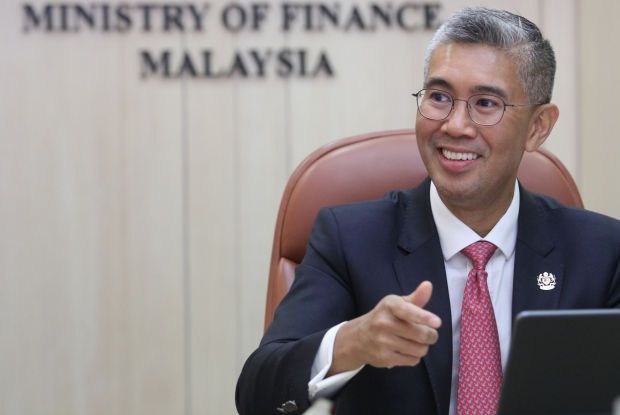
AFTER months of speculation, it is now finally clear – Finance Minister Tengku Datuk Seri Zafrul Abdul Aziz looks set to contest in Selangor as a Barisan Nasional candidate in the coming general election, which is expected to be called soon.
Tengku Zafrul will attend the Selangor Barisan convention on Sunday and will be expected to join his colleagues in the coalition’s blue uniform for the first time.
Although he is a known Umno member, the 49-year-old former banker has never been active and has stayed away from politics.
Following his appointment as the finance minister, he has been cautious in ensuring he does not take any political positions.
He kept to his role as a senator and a technocrat, picked to carry out his professional duties, like former FM Tan Sri Abdul Wahid Omar, who was also a banker.
But now he has received the endorsement of Umno’s top leaders to contest a parliamentary seat in Selangor, the richest state in the country.
It is most likely that if given the green light, Tengku Zafrul will contest the coastal seat of Kuala Selangor, located on the north-western side of the state and just 70km from Kuala Lumpur.
He has been making many visits to the constituency, which has caught the attention of the media.
But he fends off the speculation; when asked if he had eyes on Kuala Selangor, Tengku Zafrul recently replied: “My ministry is not only zooming in on Kuala Selangor but also others.
”My focus has always been, and still is, the Finance Ministry. I was also in Shah Alam, Kuala Lumpur and Sepang. I am not only coming to Kuala Selangor.”
Selangor Umno chief Tan Sri Noh Omar has openly endorsed Tengku Zafrul’s candidacy, describing him as a heavyweight and a credible candidate.
Besides his impeccable academic background in economics, accounting and management from the University of Bristol and University of Exeter, he also has a second Masters Degree from the prestigious Tsinghua University in Beijing, China.
With talk that he will spearhead Umno’s charge to regain Selangor from the PKR-led state government, some Umno leaders privately suggested that he should contest a Federal and state seat.
Likewise, they say Umno deputy president and Negri Sembilan Umno chief Datuk Seri Mohamad Hasan should do the same, as the fight in GE15 will be unprecedented at all levels.
”It is no longer business as usual. We cannot continue the same way as previously because GE15 will be a tough one,” said one Umno supreme council member.
Despite Tengku Zafrul’s lack of political experience, it will, ironically, be the best reason for him to lead the battle as Barisan needs fresh faces with solid credentials.
The ageing Selangor Barisan leaders look jaded and unappealing to the demanding urban Selangor electorate, which has been anti-establishment. Selangor has been held by the opposition Pakatan Harapan coalition for three terms since 2008.
”Over the last 30 months, Tengku Zafrul, who has a large following on social media where he is known as an urbane and moderate personality, has managed to build bridges across the political divide,” Singapore’s Straits Times reported.
It said that Tengku Zafrul’s tenure at the Finance Ministry “has so far seen a more consultative approach to policy making, with multiple engagements with the business community, professional class, trade unions and politicians, despite scepticism by Umno’s senior figures who are more comfortable with ‘government knows best’ decision making.”
He is at ease with opposition leaders and certainly Tengku Zafrul’s close relationship with the country’s royalty helps as the Rulers play a major and decisive role including even the choice of Mentri Besar, as in Selangor. Tengku Zafrul himself is of royal blood and he understands and navigates the powerful palaces best.
His challenges will be the various Umno “warlords” in the state who would also jostle for a chance to contest in GE15 as well as Parti Pribumi Bersatu Malaysia.
He was appointed to the coveted FM post by Bersatu president Tan Sri Muhyiddin Yassin when he took power in March 2020 following the collapse of the Pakatan Harapan government.
But as word leaked out of the major announcement of Tengku Zafrul’s candidacy, it has generated a lot of excitement and interest – which is what Barisan wants.
It won’t be a walk in the park for Tengku Zafrul who may find realpolitik to be rough, but it will surely be a baptism of fire for him soon.
Dislodging the Pakatan government will not be easy but certainly by having Tengku Zafrul in the ring, Barisan has provided a fresh impetus and a realistic chance in its battle to wrest back the state. Sometimes, it helps to play the underdog, too.
A HORRENDOUS claim has been making the rounds on social media. It says that Malaysia is buried in debt and is the next country, after Sri Lanka, to go bankrupt.
Curiously, many have chosen to believe this is the gospel truth. There have been plenty of rational explanations by economists debunking this myth, but they are buried mainly in the business sections of newspapers. So the general population may have missed the more reliable information.
Meanwhile, social media narratives, unfortunately, move faster and spread wider in the age of “forwarded” messages.
So it’s good that Finance Minister Tengku Datuk Seri Zafrul Abdul Aziz has taken to social media to explain these economic issues, including how rising interest rates in the United States affect the ringgit as well as other currencies.
I was informed about a pastor in a particular church who told his congregation that Malaysia is sinking financially, and he, presumably, based his sermon on this false social media news.
He purportedly even said we are the next Sri Lanka. The worshippers were then told to pray for Malaysia. It’s blasphemous because the words of preachers, regardless of their faiths, are often believed wholeheartedly.
We can argue that Malaysia is falling behind, but we haven’t arrived at the point of being a failed or bankrupt nation.
Countries with external debts running into trillions of US dollars include China, Japan, Germany and the United States, and certainly, none of them are failed states even though their debts eat into a large part of their GDP.
Sri Lanka’s economy has collapsed with debt in foreign currencies totalling US$51bil (RM227bil), and they have run out of reserves. According to one report, the country only has US$1.92bil (RM8.5bil) in reserves, which is a pittance to secure imports such as fuel.
Malaysia has a respectable amount of foreign exchange reserves while our debt in foreign currencies is a small percentage of total debt. We had a stockpile of US$116bil (RM516.4bil) at the end of last year while our debt in foreign currencies is US$6bil (RM26.7bil).
“Their [Sri Lanka’s] trade balance was negative US$8bil (RM35.6bil) for 2020, ours was a positive US$63bil (RM280bil) for 2021 – we earn a considerable amount of foreign exchange to purchase our imports, they didn’t, which is why they can’t buy foreign goods,” wrote senior business writer P. Gunasegaram at Malaysiakini.com recently.
“Their debts are 101% of gross domestic product or GDP, the sum of goods and services produced in a year, ours is 68%. Importantly, they don’t have enough foreign exchange to service their foreign debts, we have more than enough,” Gunasegaram wrote.
He rightly pointed out that “right now, it’s really not a fair or reasonable comparison at all” to equate Malaysia with Sri Lanka.
Gunasegaram further wrote that “Malaysia’s is A3 – it signifies that the issuer has financial backing and some cash reserves with a low risk of default. A-/A3 is the seventh-highest rating a debt issuer can receive and is four rankings above the cut-off for junk bonds – not great but not bad either.”
There are also a lot of misconceptions about debt. So we have economists, politicians – and journalists, sometimes – talking about various sums of money, small and large. If the point is about the country’s total debt, then it would run into trillions. It’s nothing unusual since most countries are in similar situations. However, the political agenda on social media wants us to believe that our entire generation will have to settle these debts.
It’s mind-boggling for the common man to digest that Malaysia has a total public sector debt of RM1.36tril.
But this amount includes borrowings by the federal government, statutory bodies and non-financial public corporations. The government also issues debt papers in what is one of the largest and most developed debt markets in the region. These bonds will eventually need to be repaid, too.
The federal government’s external debt is about RM28bil (US$6bil). Again, it seems big, yet it’s very manageable.
The question here is how we’re managing it, as debt is weighed based on a percentage of GDP. Currently, it’s about 63.8% of GDP and it used to be 53% before the Covid-19 pandemic. This merely means we need to be prudent and bring the numbers down over the next few years.
Another big difference between Sri Lanka and Malaysia is that we are net exporters of natural gas, and we can afford to subsidise fuel and keep inflation under control. On the other hand, Sri Lanka’s major exports are tea, garments and textiles.
But that doesn’t mean all is hunky dory down the road for Malaysia if we don’t get our act together. Disturbing signs have already prevailed.
Mismanagement and the results of corruption, leakages and incompetency usually only surface a decade later in most cases.
We are not Sri Lanka, but neither should we be content with what’s happening in Malaysia. We deserve better.
Despite what our politicians may want to say, we must gradually lower our subsidy bills. We are spoilt. We live in one of the most subsidised nations on Earth, yet many are clueless about this.
Given this situation, any reduction can only be done gradually without hurting the people’s pockets too much.
As it is now, Malaysians are already struggling. Had the government stuck to its earlier decision to remove ceiling prices on chicken, eggs and cooking oil, the effects would have been disastrous and could possibly have even resulted in massive street protests.
The central bank’s foreign reserves of US$109.2bil (RM480.9bil) as of June 15, 2022, is reportedly the lowest since early 2021, and the drop of US$3.6bil from May 31, 2022, is also the largest in seven years. While economists don’t think the decline is alarming, we certainly need to recover our revenue.
Our leaders need to talk more about growth. Please stop wasting time on unproductive and contentious issues which divide the nation and bring no value to the country.
What we need to do is to improve our competitiveness, employment, public finance, productivity and efficiency.
To be fair, Malaysia attracted RM42.8bil in approved investments until March this year.
Yes, Covid-19 has caused Malaysia to slip seven notches to 32nd in the 2022 International Institute for Management Development World Competitiveness Ranking, so we need to get back on our feet now.
If we can’t even resolve our labour shortage issue, it means we’re still on the starting blocks while everyone else is eyeing the finish line.
Oil palm fruits are left rotting, restaurants can’t open, and businesses are struggling because of this simple issue – which should have been sorted out in the last two years when we were stagnant.
Billions of ringgit are going down the drain as Malaysia squabbles over hiring methods and protocols.
It’s often said that Malaysia is a lucky country as we have crude oil and palm oil, but it’s a waste when we don’t have people to harvest these fruits, and the peak season is right now, unfortunately.
So we really need to sell the Malaysian story better to ourselves and to the world because we’re ailing from an image problem.